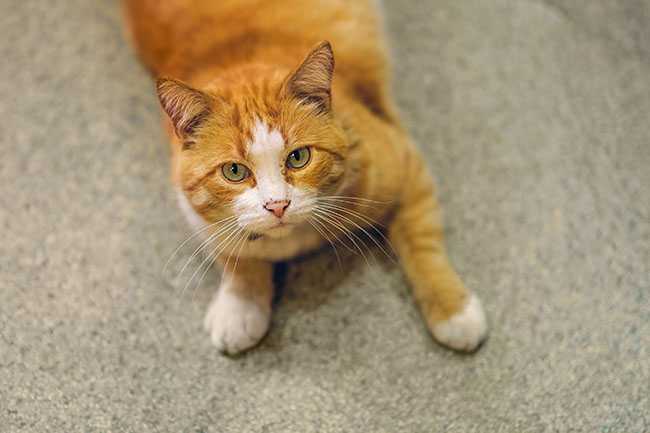
Pet Nutrition Researchers at OVC Study Healthy Weight in Cats
October 13, 2021
National Pet Obesity Awareness Day - The Role of Choline for Healthy Weight in Cats
 Members of the Pet Nutrition team at the University of Guelph’s Ontario Veterinary College (OVC) are conducting innovative research to optimize canine and feline nutrition. Some of their ongoing work focuses on optimizing pet nutrition to prevent obesity, as well as supporting animals through weight loss programs.
Members of the Pet Nutrition team at the University of Guelph’s Ontario Veterinary College (OVC) are conducting innovative research to optimize canine and feline nutrition. Some of their ongoing work focuses on optimizing pet nutrition to prevent obesity, as well as supporting animals through weight loss programs.
On October 13, Canada’s National Pet Obesity Awareness Day, we are featuring some of this research. This day serves as a reminder for owners to consider their pet’s current weight and speak with their veterinary healthcare team if they suspect their pet is overweight.
Weight loss programs usually begin with restricting calories to treat or prevent obesity; however, researchers suspect that cats may not meet their nutrient requirements during weight loss.
In a recent study, Dr. Caitlin Grant, OVC Department of Clinical Studies and Nestlé Purina Professorship in Companion Animal Nutrition, investigated nutritional gaps that may exist when cats are fed a restricted amount of food. Grant studied nutrient intake in a group of cats that were fed a weight loss diet and determined the effects of a period of restricted calories on obese cats. Her findings suggest that two essential nutrients, choline and arginine, were below the National Research Council (NRC) recommended allowance and even below the NRC minimum requirement in calorie-restricted cats.
This lack of choline is particularly concerning because it is an important nutrient in fat metabolism, the breakdown of dietary fats. Their bodies cannot produce enough choline to meet their needs, so cats must instead get choline through their diet. In other species, choline has a key role in reducing fat buildup in the liver and is thought to play an important role in reducing the risk of hepatic lipidosis, or fatty liver disease. This is a painful and potentially life-threatening condition where excess fat is accumulated in the liver, leading to liver damage or failure. Fatty liver disease is a consequence of a cat experiencing an extended period of anorexia or loss of appetite, often due to an underlying illness. This anorexia can cause mobilization of fat stores for energy and can result in a build-up of fat in the liver. “We consider obese cats to be particularly at risk because they simply have more fat that can be mobilized, compared to a lean cat,” says Grant. “We are always thinking about this risk, which is why we restrict cats carefully and monitor them closely so they have controlled weight loss.”
A recent study led by OVC PhD candidate Alex Rankovic, Department of Biomedical Sciences, continued Grant’s research by exploring the effects of dietary choline supplements in obese cats. Rankovic studied the effects of feeding a choline-rich maintenance diet, a diet that does not induce weight change, to obese cats. Her findings suggest that liver health was improved and more fat was moved out of the liver in choline-supplemented cats. Rankovic’s research demonstrates the increased dietary intake of choline may improve the safety and efficacy of weight loss in the treatment and care of obese cats, although more research is necessary.
The OVC Pet Nutrition Team continues to investigate the role of choline for healthy weight in pets.
An infographic describing OVC PhD candidate Alex Rankovic’s recent publication.
Text for Infographic describing OVC PhD candidate Alex Rankovic’s recent publication.

.png)